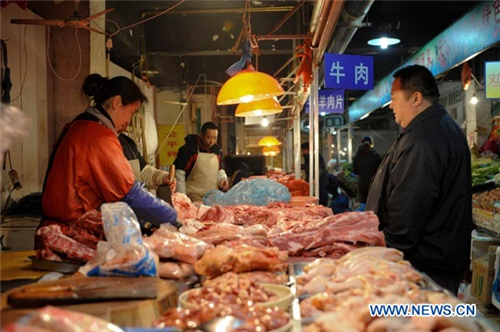China's consumer price index (CPI), a main inflation indicator, climbed 3.2 percent year-on-year in February, the National Bureau of Statistics (NBS) announced Friday.
 |
|
A citizen buys pork at a farming produce market in Changchun, capital of northeast China's Jilin Province, Feb. 9, 2012. (Xinhua/Zhang Nan)
|
The growth, down from 4.5 percent in January, hit the lowest level in 20 months and was the first monthly inflation rate falling below 4 percent since October 2010, providing more room for the government to stimulate growth.
In the first two months, the country's CPI increased 3.9 percent compared with the previous year. On a monthly basis, CPI dipped 0.1 percent in February, the NBS said.
Food prices, which account for nearly one-third of the weighting in the calculation of China's CPI, rose 6.2 percent from a year earlier in February. The data is a sharp decrease from January's 10.5 percent rise when China’s Lunar New Year holiday boosted food prices.
The producer price index, a measurement of inflation at the wholesale level, was the same as the year-earlier reading.
Importantly, the February CPI marks the end of the "negative deposit rate" era that's been in place since February 2010, as the inflation rate has finally fallen below the annual 3.5 percent rate for one-year fixed deposits.
"This is a landmark in China's efforts to control prices that started in the second half of 2010," said Jia Kang, a senior researcher with the Ministry of Finance.
Li Daokui, an adviser to the People's Bank of China, said he expected to see inflation ease to 2.5 percent in the middle of the year, and for annual CPI to be around 3 percent "as long as there is no extreme weather or an oil crisis in Iran, which could pose more inflationary risks".
"This and a moderation in CPI growth will increase the possibility that the central bank would cut the reserve requirement ratio (RRR) for banks in the near future," said Lian Ping, chief economist at the Bank of Communications.
The country's central bank last month lowered the RRR by 50 basis points, the second cut in three months, underling its efforts to ease short-term credit crunch and secure growth in the wake of a lackluster external market.
Although the inflationary pressure is lower this year, there are potential risks that will push up prices, and pose a threat to the economy if not contained, said Ma Jiantang, the head of the NBS, on Monday.
Experts expect policy easing in the near term will take the form of additional cuts in RRR instead of interest rates.
"The sharp decrease in the February reading was mainly caused by a higher base during the 2011 Lunar New Year, and retreating food prices after this year's festival," said Lian Ping, chief economist at Bank of Communications Ltd.
Lian said the reserve requirement ratio for lenders may be lowered at least twice or possibly four times this year to facilitate stable growth, but rejected suggestion that there may be massive reductions, because "time is still needed to digest excessive liquidity".
"As the pressure of long-term inflation remains, it's not necessary to reduce the benchmark interest rate," he said.
Jiang Chao, an analyst with Guotai Junan Securities Co Ltd., also believed that "there is not enough motivation for the central bank to cut the interest rate at the moment."
"Unlike in 2008, when the economy was in deflation, current economic growth is quite stable ... and the policy environment is one of de facto relaxation," he said.